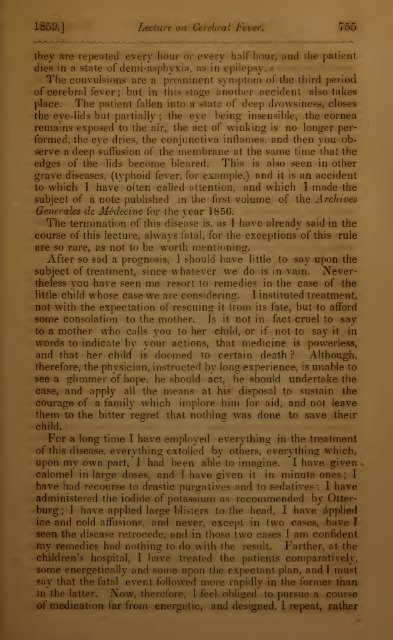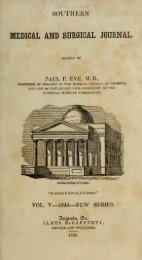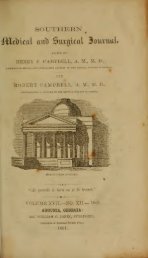754 Lecture on Cerebral Fever. [November,<strong>and</strong> if you examine this member you will find motion, power <strong>and</strong>sensibility more or less affected. The paralysis of cerebral feverhas this peculiarity about it : it appears to be variable. 1 willexplain what I mean; one day you ascertain the fact that upontickling the soles the child withdraws one of its feet more readilythan the other ; some days afterwards, in repeating the experiment,you find that it is no longer the right leg, for example, whichit moves more easily, but the left. It seems, <strong>and</strong> let me repeatthe word, it seems as if the paralysis had ceased upon the rightside, <strong>and</strong> passed to the left ; but this is not so. The member primarilyparalyzed remains so, but the paralysis not increasing, itretains the movements which you have seen executed morefeebly than upon the healthy side ; but the other side, healthyuntil now, is paralyzed in its turn, <strong>and</strong> the stroke being moresevere than upon the side first affected, sensibility <strong>and</strong> powerof motion are almost abolished, <strong>and</strong> it seems now alone affected,while in truth the other is also paralyzed, but in a less degreethan the second.The lesions which we find afterwards at the autopsy give anexplanation of this fact; for if the paralysis has remained limitedto the right side, the cerebral lesion is found only upon the leftside, while if the paralysis has seemed to pass from one side tothe other, there are cerebral lesions upon both sides, but moremarked upon one side than upon the other. I have thoughtnecessary to dwell upon this peculiarity of the paralysis in thisaffection, for, in my belief, it is seen only in cerebral fever.Let us return to the convulsions. Rare in the first period,occurring in the second only in a modified form <strong>and</strong> resemblingepileptic vertigo, in the third period they make their appearance,first in the form called convulsions internes [inward fits yin thecommon language of this country,] afterwards increasing toattacks of general eclampsia. If we observe closely a child inthis stage of the disease, we see at certain times its countenanceisdistorted, <strong>and</strong> its jaws move mechanically as if chewing, whileits thumb <strong>and</strong> fingers are flexed into the palm of the h<strong>and</strong> ; tothis stiffness complete relaxation succeeds ; there has been a truetonic convulsion of certain classes of muscles, <strong>and</strong> not onealternately tonic <strong>and</strong> clonic as in general attacks implicatingthe muscles of the extremities. These are the internal convulsions,having a duration of eight, ten, twelve, or fifteen minutes,during which the eyes are turned upwards <strong>and</strong> inwards,<strong>and</strong> agitated by slight oscillations. The diaphragm, <strong>and</strong> theconvulsive move-muscles of the glottis may be seized with thesements, <strong>and</strong> then the patient is suffocated—respiration can nolonger be performed.As the disease approaches its fatal termination, general convulsionscome on, <strong>and</strong> generally death occurs in one of these attacks ;
1859.] Lecture on Cerebral Ftthey are repeated every hour or every hall' hour, <strong>and</strong> the patientdies in a state of dem i-asphyxia, as in epilepsThe convulsions are a prominent symptom of the ihird periodof cerebral fever ; but in this stage another accident also takesplace. The patient fallen into a state of deep drowsiness, closesthe eye-lids but partially ; the eye being insensible, the cornearemains exposed to the air, the act of winking is no longer performed,the eye dries, the conjunctiva inflames, <strong>and</strong> then you observea deep suffusion of. the membrane at the same time that theedges of the lids become bleared. This is also seen in othergrave diseases, (typhoid fever, for example,) <strong>and</strong> it is an accidentto which I have often called attention, <strong>and</strong> which 1 made thesubject of a note published in the first volume of the ArchivesGenerates de Medecine for the year 1850.The termination of this disease is. as I have already said in thecourse of this lecture, always fatal, for the exceptions of this ruleare so rare, as not to be worth mentioning.After so sad a prognosis, I should have little to say upon thesubject of treatment, since whatever we do is in vain. Neverthelessyou have seen me resort to remedies in the case of thelittle child whose case we are considering. I instituted treatment,not with the expectation of rescuing it from its fate, but to affordsome consolation to the mother. Is it not in fact cruel to sayto a mother who calls you to her child, or if not to say it inwords to indicate by your actions, that medicine is powerless,<strong>and</strong> that her child is doomed to certain death ? Although,therefore, the physician, instructed by long experience, is unable tosee a glimmer of hope, he should act, he should undertake thecase, <strong>and</strong> apply all the means at his disposal to sustain thecourage of a family which implore him for aid, <strong>and</strong> not leavethem to the bitter regret that nothing was done to save theirchild.For a long time I have employed everything in the treatmentof this disease, everything extolled by others, everything which,upon my own part, I had been able to imagine. I have givencalomel in large doses, <strong>and</strong> I have given it in minute ones; Ihave had recourse to drastic purgatives <strong>and</strong> to sedatives ; I haveadministered the iodide of potassium as recommended by Otterburg; I have applied large blisters to the head, I have appliedice <strong>and</strong> cold affusions, <strong>and</strong> never, except in two cases, have Iseen the disease retrocede, <strong>and</strong> in those two cases I am confidentmy remedies had nothing to do with the result. Farther, at thechildren's hospital, I have treated the patients comparatively,some energetically <strong>and</strong> some upon the expectant plan, <strong>and</strong> I mustsay that the fatal event followed more rapidly in the former thanin the latter. Now, therefore. I feel obliged to pursue a courseof medication far from energetic, <strong>and</strong> designed, I repeat, rather
- Page 1 and 2: SOUTHERNMEDICAL AND SUBGICAL JOURNA
- Page 3 and 4: 1859.] Climate to the Consumptive,
- Page 5 and 6: 1859.] Climate to the Consumptive,
- Page 7 and 8: Aug.Oct.1859.] Climate to the Consu
- Page 9 and 10: 1859.] Climate to the Consumptive,
- Page 11 and 12: 1859.] Climate to the Consumptive,
- Page 13 and 14: 1S59.] Climate to tJte Consumptive,
- Page 15 and 16: 1859.] Climate to l/ie Consumptive,
- Page 17 and 18: 1859.] Climate to the Consumptive,
- Page 19 and 20: 1859.] Climate to the Consumptive,
- Page 21 and 22: 1859.] Dugas, on Fracture of Hie Sc
- Page 23 and 24: 1869.] Lecture upon Cerebral Fever.
- Page 25 and 26: • of1859.] Lecture on Cerebral Fe
- Page 27 and 28: 1859.] Lecture on Cerebral Fever. 7
- Page 29 and 30: 1859.] Lecture on Cerebral Fever. 7
- Page 31: 1859.] Lecture on Gerebral J' 753un
- Page 35 and 36: :1859.] Attempted Abortion and Deat
- Page 37 and 38: 1859.] Attempted Abortion and Death
- Page 39 and 40: :—:1859.] Diphtheria. 761by its o
- Page 41 and 42: —:1859.] Diphtheria. 763ride of i
- Page 43 and 44: ——1859.] Diarrhoea of Infants a
- Page 45 and 46: 1859.] Action of Mercury on the Sec
- Page 47 and 48: 1859.] Defective Assimilation in In
- Page 49 and 50: —1859.] Cancerous Ulceration clos
- Page 51 and 52: —1859.] Vegetation of the Genital
- Page 53 and 54: 1859.] Gases of Suppression of the
- Page 55 and 56: 1859.] Cases of Suppression of the
- Page 57 and 58: ——;1859.] After-treatment of th
- Page 59 and 60: 1859.] Dr. 0. C. Gibbs. Summary. 78
- Page 61 and 62: 1859.] Dr. 0. C. GrBBS. Summary, 78
- Page 63 and 64: :;1859.] Secale Cornulam for t?ie E
- Page 65 and 66: 1859.] Divisions for the Cure of De
- Page 67 and 68: ;1859.] Incision in Anthrax. 789Inc
- Page 69 and 70: :;1859.] Editorial and Miscellaneou
- Page 71 and 72: ———and1859.] Miscellaneous. 7








